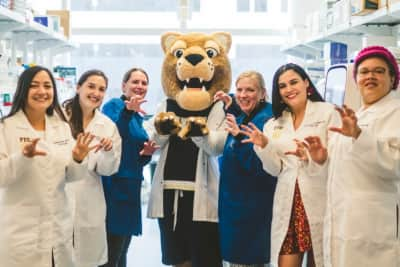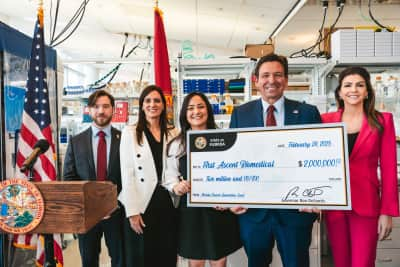Make a difference
Your support can help fuel this innovative research.
The Azzam Lab tackles advanced cancers through the usage of functional precision medicine in cancer treatment as well as a multifaceted study of cancer stem cells, the cells responsible for cancer relapse and metastasis.
Projects in the lab include the implementation of functional precision medicine to assess efficacious treatment options in advanced pediatric and adult cancers, examination of the impact of environmental toxins on cancer stem cell development, and functional analysis of the neuroinflammatory biomarker TSPO in glioblastoma.

FIU researcher Diana Azzam and the Azzam Lab collaborated with Nicklaus Children’s Hospital to conduct a first-of-its-kind clinical trial for personalized treatment of children’s cancer using a unique functional precision medicine approach.
Your support can help fuel this innovative research.
Diana Azzam
Associate Professor, Environmental Health Sciences
dazzam@fiu.edu
Ebony Coats
Research Specialist I
ecoats@fiu.edu
AHC4
Arlet Maria Acanda De La Rocha
Research Assistant Professor
aacandad@fiu.edu
AHC4
Yasmin Ghurani
Undergraduate Intern
Victoria Reis
Undergraduate Intern
The Azzam Lab has been prominently featured in multiple news outlets, including The Conversation's articles on personalized cancer treatment and the arsenic contamination of food and water.

FIU named to new genetic medicine consortium

Science March Madness: FIU health researchers make it to the championship round

Gov. DeSantis announces $2 million to expand access to FIU personalized cancer treatment technology

Redefining Personalized Cancer Treatment

Freshman helps with groundbreaking cancer research

New approach helped Patient 13 reach remission — could it revolutionize how cancer is treated?